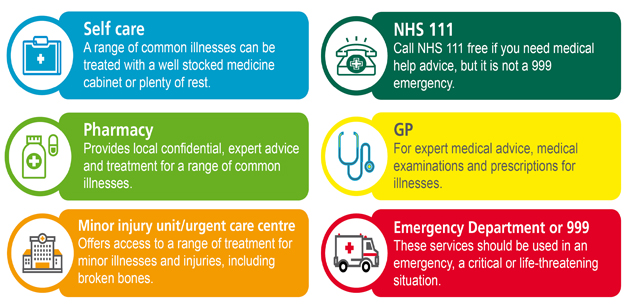
| Self-care Hangover – Take care of yourself Grazed knee – Keep a well stocked medicine cabinet |
| Pharmacist (Chemist) Go to nearest Pharmacy Pharmacists are highly trained healthcare professionals and can give you advice on illnesses and for minor ailments (see below) medicine, you need to treat them. Athletes foot Hay fever Nappy rash Blocked nose Headache Sore throat Cold sores Head lice Sprain; strain or muscle pain Constipation Heartburn and Indigestion Temperatures Cough Insect bite and sting Threadworms Diarrhoea Minor skin conditions Thrush Earache Mouth ulcers |
| GP (Doctor) Being sick Stomach bugs Ear pain Backache Call your GP: Your local GP surgery will provide a wealth of services; advice, assessment, prescriptions examinations and much more. |
| NHS walk-in-centre or minor injuries unit Cuts Strains Rashes Sprains Go to the nearest walk-in-centre or minor injuries unit: Located throughout the region they assess and treat minor illnesses. The Nearest Walk In Centre is,Park Community Practice, Horne Street Medical Centre, Hanson Lane, Halifax HX1 5UA, 01422 399858. Opening times: Weekends – 8am till 8pm, Bank Holidays 8am till 8pm. |
| NHS 111 Unexpected Sickness Severe Pain Worsening Health Condition Unwell Unsure Via text phone call 18001 111 Confused www.nhs.uk/111 Need Help Ring 111 free including mobiles. When it’s not a 999 Emergency but you need medical help fast. 24 hours a day. Via text/phone call 18001 111 You think you need to go to A&E or another NHS urgent care service. You don’t know who to call for medical help or don’t have a GP to call. You require health information or reassurance about what to do next. For immediate, life-threatening emergencies, continue to call 999 |
| A&E OR 999 Choking Chest pain Severe bleeding Head injury/blacking out Overdose Suspected broken bone Go to A&E or ring 999. Accident and Emergency Departments provide immediate emergency care in very serious or life-threatening situations. In an emergency you should go directly to your local A&E department/dial 999 Generally you should treat the situation as an emergency if: – The person has stopped breathing or their heart has stopped. – The person is experiencing severe chest pain or is having trouble breathing. – There is severe bleeding from any part of the body. – The person is, or has been unconscious. – There has been a serious head injury. – The person has a severe burn/scald. – The person has a severe allergic reaction. – The person has a numbness or weakness down one side/ or has problems understanding what you are saying. – There is suspected broken bone or dislocation. – The person is experiencing severe stomach ache that cannot be treated by over-the-counter remedies. – The person has overdosed or poisoned themselves. |